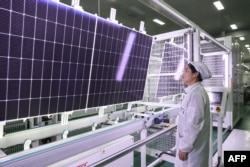The Biden administration has delayed an announcement on final determinations regarding steep tariff increases on Chinese made electric vehicles, batteries, semiconductors, and solar cells which were due to begin on August 1.
The U.S. trade representative said Saturday it “continues to develop the final determination regarding proposed modifications” on China-made goods, according to a spokesperson from the agency.
This delay does not come as a surprise to Thibault Denamial, an associate fellow and Scholl Chair in International Business at the Center for Strategic and International Studies. He says this being an election year requires the Democratic Party to balance competing issues when deciding how to implement the tariffs.
“The Democratic Party certainly doesn’t want to seem soft on China,” Denamial told VOA. “But there is so much pushback from industry and from domestic stakeholders who argue that the new tariffs are going to be destructive to the U.S. economy, so kicking the can [delaying action on the tariffs] seems like an attractive option right now,” he added.
The United States is currently scheduled to implement a 100% tariff on China-made EVs, a 50% tariff on semiconductors and solar cells, and a 25% tariff on lithium-ion batteries and strategic goods such as steel, aluminum and ship-to-shore cranes in the coming days.

Washington is implementing the tariffs as it seeks to decrease its reliance on China along with views that China allegedly has used unfair business practices to expedite the growth of certain industries critical to supply chains and the global green transition.
This past August, the EU announced a provisional tariff increase on China-made EVs to 37.6% and lowered it to 36.3% a few weeks later. Canada said last week it would follow the U.S.’s footsteps announcing a 100% tariff on China-made EVs.
Wendy Cutler, vice president at the Asia Society Policy Institute, says she thinks China will respond to the tariff hikes “swiftly, proportionally and in a non-escalatory manner.”
“China has a number of options in terms of responding to any tariff hikes imposed by the United States or any of its trading partners,” she told VOA.
She explained one option for China would be to respond in a proportional manner.
“The U.S. tariff hikes announced have a value of about $18 billion, and so one option for China would be just to adjust its tariff schedule and raise tariffs in a proportional manner on U.S. imports into China,” she told VOA.
She also noted China’s ability to take the “United States to [a] WTO [World Trade Organization] dispute settlement, claiming that we are [the United States] violating the WTO rules.”
China recently announced an anti-subsidy probe on dairy imports from the EU, which was seen by the EU’s Chamber of Commerce in China as pushback to Brussel’s provisional tariffs on EVs.
“The commission will firmly defend the interests of the EU dairy industry… and intervene as appropriate to ensure that the investigation fully complies with relevant WTO rules,” according to an EU statement.
Rush Doshi is the director of the China Strategy Initiative at the Council on Foreign Relations. Doshi says the probe is a form of economic self-defense.
“The PRC is essentially telling them [the EU] they cannot practice any form of economic self-defense or the PRC will target their imports. They’re going after dairy because they think it is politically painful,” Doshi explained in a written statement to VOA, using an abbreviation of the country’s formal name, the People’s Republic of China.
Cutler says that while a WTO dispute settlement is a potential route for China to take when responding to Washington’s tariffs, it is not the likeliest option due to the WTO’s lack of appellate body judges.
“There wouldn’t be an outcome that would sanction retaliation,” she explained to VOA.
She says a likelier route China may take is further limiting export restrictions, such as increasing export limits on critical minerals, an area where the U.S., Canada, and EU may be vulnerable.
Denamial maintains export limits may be a way to create some worry for U.S. policymakers, specifically in the critical mineral space.
“I think that [export limits] is where the U.S. economic and national security policymakers have been a little more worried, quite frankly, because the direct effects can be more dire on the United States and allies.”
He says critical minerals are “the kind of goods that China has clearly targeted” adding that “China is extremely dominant in the critical minerals and raw material supply chain, specifically the processing and refining stage.”
On September 15, Beijing’s Ministry of Commerce announced export limits on antimony, a critical mineral used in a range of products from military ammunition, nuclear weapons and night goggles to batteries.
In addition to export limits, Beijing may also increase the priority of exporting to developing countries according to Cutler.
She explained to VOA, how at China’s third plenum — a meeting among high-level Chinese officials to discuss economic and political policy measures for the next 5-10 years — Beijing made a “call in the third plenum documents… to conclude more free trade agreements, particularly with the developing world.” Denamial furthered this sentiment explaining Beijing may start exporting to non-Western countries out of necessity.
“That’s sort of something that happens almost organically,” he said. “One of the main questions that you have when you see these countries such as the United States or Canada, who have imposed the most stringent tariffs on green technologies, for instance, the next question is, where are all of these goods going to go,” explained Denamial.
Doshi says Beijing’s overproduction of goods will affect China’s responses to the tariffs. “The PRC is targeting commodity exports from other economies that try to protect their industries from PRC excess capacity,” he told VOA.

